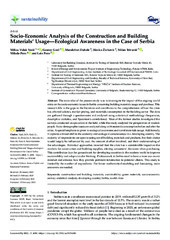Приказ основних података о документу
Socio-Economic Analysis of the Construction and Building Materials’ Usage—Ecological Awareness in the Case of Serbia
| dc.creator | Vasić, Milica | |
| dc.creator | Goel, Gaurav | |
| dc.creator | Dubale, Mandefrot | |
| dc.creator | Živković, Slavica | |
| dc.creator | Trivunić, Milan | |
| dc.creator | Pezo, Milada | |
| dc.creator | Pezo, Lato | |
| dc.date.accessioned | 2023-02-27T10:43:49Z | |
| dc.date.available | 2023-02-27T10:43:49Z | |
| dc.date.issued | 2023 | |
| dc.identifier.uri | http://rims.institutims.rs/handle/123456789/449 | |
| dc.description.abstract | The main idea of the present study was to investigate the impact of the ongoing world crisis on the socio-economic issues in Serbia concerning building materials usage and purchase. This research fills in the gaps in the literature and contributes to the comprehension of how the crisis has affected salaries, market pricing, and materials consumption in the building sector. The data are gathered through a questionnaire and analyzed using a statistical methodology (frequencies, descriptive statistics, and Spearman’s correlations). Most of the former studies investigated the surveys conducted on specialists in the field, while this study analyzed the perspectives of random people. Socio-demographic issues are analyzed along with materials consumption before and after the crisis. A special emphasis is given to ecological awareness and novel materials usage. Additionally, it captures a broad shift in the economy and ecological consciousness in a developing country. The majority of respondents are open to using novel building materials and products, but their choice would largely be influenced by cost, the amount of effort involved, and their understanding of the advantages. Statistical approaches revealed that the crisis has a considerable impact on the markets for construction and building supplies, altering consumers’ decisions when purchasing. This contribution lays the groundwork for developing countries in the modern world to improve sustainability and adopt circular thinking. Professionals in Serbia need to have a more eco-aware mindset and enhance how they provide pertinent information to potential clients. This study is limited by the number of respondents. For future mathematical modeling and forecasting, more answerers are needed. | sr |
| dc.language.iso | en | sr |
| dc.publisher | MDPI | sr |
| dc.rights | openAccess | sr |
| dc.rights.uri | https://creativecommons.org/licenses/by-sa/4.0/ | |
| dc.source | Sustainability 2023, 15, 4080 | sr |
| dc.subject | construction and building materials | sr |
| dc.subject | sustainability | sr |
| dc.subject | green materials | sr |
| dc.subject | socio-economic survey; | sr |
| dc.subject | statistical analysis | sr |
| dc.subject | developing country | sr |
| dc.subject | Serbia | sr |
| dc.subject | world crisis | sr |
| dc.title | Socio-Economic Analysis of the Construction and Building Materials’ Usage—Ecological Awareness in the Case of Serbia | sr |
| dc.type | article | sr |
| dc.rights.license | BY-SA | sr |
| dc.citation.volume | 15 | |
| dc.identifier.doi | 10.3390/su15054080 | |
| dc.identifier.fulltext | http://rims.institutims.rs/bitstream/id/1086/bitstream_1086.pdf | |
| dc.type.version | publishedVersion | sr |

